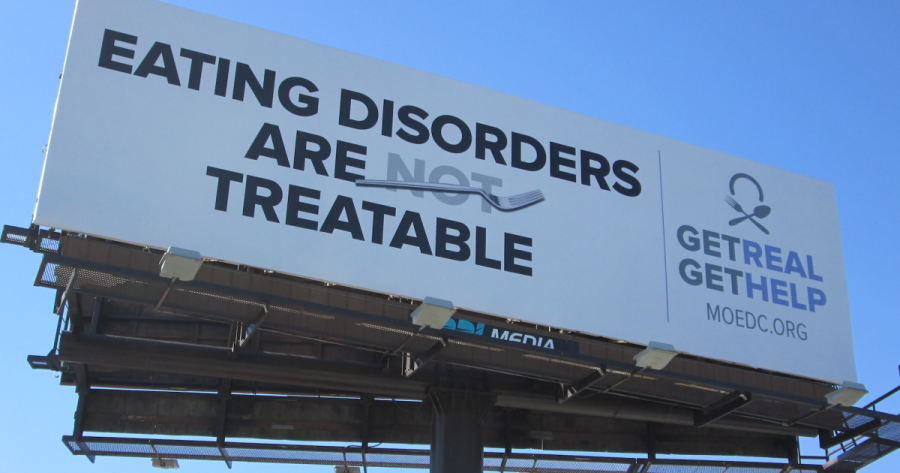Could eating disorders be contagious?
Perhaps it’s not our own motivations that drive us to dangerous and unhealthy behavior — it could be our desire to out-do the people around us
Photo courtesy of npr.org (Kennessy Baban)
Eating disorders have a long and unfortunate relationship with perfectionism
April 8, 2022
Eating disorders may be contagious.
I know what you’re thinking. Contagious diseases are communicable diseases exchanged between people, and you can’t literally get an eating disorder from being within six feet of someone with one. But, in a metaphorical sense, you kind of can.
According to the Center for Discovery, an eating disorder treatment center, the more accurate term for what eating disorders can be is social contagion. Just like rumors and fads spread through a crowd, eating disorders can similarly extend from one person to another. There’s a reason first-degree relatives of someone with an eating disorder are so at risk.
It starts with someone’s predisposition to an eating disorder, which can determine how easily they can be influenced by someone around them. Risk factors for eating disorders include genetics, poor body image, low self-esteem and mental illnesses.
The spread of eating disorders can start with something as simple as perfectionism; on the surface, perfectionism seems like a strength as it can lead people to work harder. However, for many people with eating disorders, this very trait is what drove them to their condition. Perfectionism can stem from external factors, or it can come from internal pressure. As one tries to meet the standards the pressure puts on him/her, one may find themselves excessively checking and organizing. Perfectionism regarding someone’s weight and body composition is behind a lot of the obsessive thoughts that someone with an eating disorder faces.
When a perfectionistic individual meets someone with an eating disorder (another potentially perfectionistic individual), social contagion may begin. Perfectionism drives a person’s desire to be perfect, and to be perfect, someone has to be better than everyone else. Even if they do not mean to be, people with eating disorders tend to be competitive by nature. While some try to hide their condition, others do not (especially if they do not see a problem with it). It may begin with them bragging about skipping a meal or another type of disordered eating behavior. When the other perfectionistic individual is exposed to this, they are subjected to feeling as though they have to do these behaviors too in order to be good enough.
Alana Barton, a sophomore at RV, talked about her firsthand experience with this concept.
“My friend used to tell me about how she would skip meals and not eat all day and how she started getting dizzy attacks and her vision would start to blur if she did too much activity,” she said. “I already thought she looked perfect. I even envied her in some ways, so when she opened up to me about her eating disorder it made me feel like, that’s what I had to do to look like her. We were young so we didn’t look at all the serious consequences eating disorders can lead to, but we have grown since then and have healthier eating habits.”
Aside from being exposed to dangerous eating habits in real life, the distorted views that come with an eating disorder can be even more toxic as a result of our online behavior. As much as the internet tries to restrict pro-anorexia content, some of it slips through the cracks.
One common video is a trend called “What I Eat In A Day,” which can lead to the spiral of competition beginning as people try to have a perfect day of eating. In magazines too many companies only use ultra-thin models, and many social media sites determine likes based on thinness. Someone with an eating disorder on a site may risk someone else developing an eating disorder if they body check while encouraging unhealthy behaviors in their posts.
This doesn’t mean you can’t talk to other people if you have an eating disorder. You can and should. It’s just a matter of being careful and talking to professionals when possible. It’s important to open up to friends, but trauma dumping or encouraging toxic behaviors as trendy is a lot different than going to a friend for support. Sometimes it is dangerous for two people with eating disorders to try to rely on one another for help, because if one relapses, the other may follow suit. A lot of eating disorders are made up of not only perfectionism, but also guilt for a perceived slipping up. If being around someone makes you feel as though you are slipping up by not relapsing into an eating disorder, then that person may not be in your best interest for your recovery.
If you or someone you know is struggling with an eating disorder, the National Eating Disorders Association Helpline’s number is 1-800-931-2237. No matter who you are, there is someone to support you.












